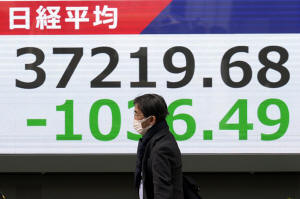Stock market today: World shares skid, hit by Trump tariff hikes and
doubts about AI
[February 28, 2025] By
ELAINE KURTENBACH
BANGKOK (AP) — Shares retreated Friday in Europe and Asia, with
benchmarks in Japan, Hong Kong and South Korea tumbling more than 2% as
U.S. President Donald Trump’s decision to push ahead with 25% tariffs on
imports from Mexico and Canada and to double tariffs on Chinese products
to 20% left investors reeling.
Germany's DAX fell 0.4% to 22,458.23, while the CAC 40 in Paris gave up
0.4% to 8,073.90. Britain's FTSE 100 edged 0.1% lower to 8,751.32.
But U.S. futures gained, with the contracts for the S&P 500 and Dow
Jones Industrial Average up 0.3%.
In Asian trading, Tokyo's Nikkei 225 index lost 2.9% to 37,155.50,
pulled lower by plunging prices for shares in technology companies.
Computer chip test equipment maker Advantest sank 8.8%, Disco Corp.,
another equipment maker, lost 10.3% and Tokyo Electron shed 4.5%.
Hong Kong's Hang Seng index dropped 3.3% to 22,941.32, while the
Shanghai Composite index lost 2% to 3,320.90.
Trump said Thursday that “the proposed TARIFFS scheduled to go into
effect on MARCH FOURTH will, indeed, go into effect, as scheduled” for
imports from Canada and Mexico.
China's Commerce Ministry issued a statement Friday protesting Trump's
decision to raise tariffs on imports from China by 10%, saying it
violated international trade rules and would add to the “burden on
American companies and consumers and undermine the stability of the
global industrial chain.”

South Korea's Kospi gave up 3.4% to 2,532.78.
In Australia, the S&P/ASX 200 shed 1.2% to 8,172.40.
On Thursday, the S&P 500 sank 1.6% and the Dow dropped 0.4%. The Nasdaq
composite tumbled 2.8%.
The S&P 500 has fallen five out of the past six trading sessions after
setting an all-time high last week. Concerns about the U.S. economic
outlook have been behind much of the drop, including worries over how
tariffs could worsen inflation and mass layoffs of government workers
could increase unemployment.
Superstar stock Nvidia, one of Wall Street’s most influential companies
that’s been leading the market for years, lost 8.5% after initially
rising at the open of trading following a better-than-expected profit
report.
[to top of second column] |

A person walks in front of an electronic stock board showing Japan's
Nikkei index at a securities firm Friday, Feb. 28, 2025, in Tokyo.
(AP Photo/Eugene Hoshiko)
 Better-than-expected earnings
reports have become routine for Nvidia, whose chips are powering the
surge into artificial-intelligence technology, but this was the
company’s first since China's DeepSeek shook the entire AI industry
by saying it has a large language model that can compete with the
world’s best without using the most expensive chips.
All the talk on tariffs has left U.S. households more nervous about
the economy. That’s dangerous because their strong spending has been
a main reason the U.S. economy has avoided a recession.
Such uncertainty also pressures the Federal Reserve, which has few
if any tools to help an economy where growth is slowing and
inflation is rising at the same time.
For now, at least, the U.S. economy appears to be in solid shape.
The government on Thursday left alone its estimate for the U.S.
economy’s performance during the last three months of 2024, though
it raised its estimate for a measure of inflation during the
quarter.
A separate report said more U.S. workers applied for unemployment
benefits last week. While the number is at a three-month high, it’s
still nowhere close to where it’s been in past recessions.
In other trading early Friday, U.S. benchmark crude oil lost 70
cents to $69.65 per barrel in electronic trading on the New York
Mercantile Exchange.
Brent crude, the international standard, handed back 66 cents to
$72.91 per barrel.
The U.S. dollar rose to 150.44 Japanese yen from 149.82 yen late
Thursday. The euro rose to $1.0402 from $1.0401.
All contents © copyright 2025 Associated Press. All rights reserved
 |